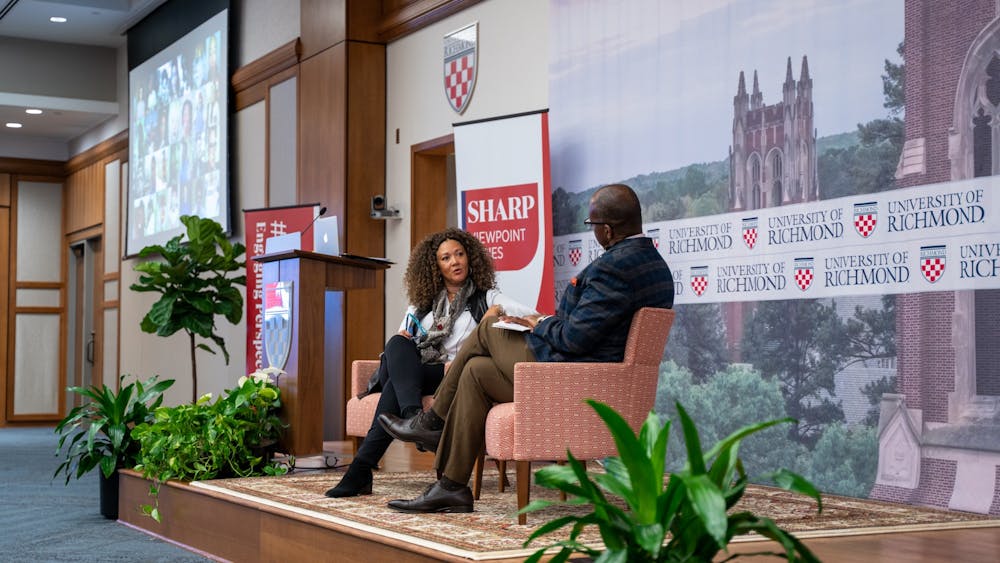Last week, a board asking students to write down their thoughts about race in six words on postcards appeared in the lobby of the Heilman Dining Center.
About a week later, dozens of cards filled the board with messages such as “You can’t have an N-word pass,” “Mexico isn’t the only country that speaks Spanish” and “Not all Asians are good at math.”
The installation was part of The Race Card Project, which is meant to start honest conversations about race, according to creator Michele Norris, journalist and host of the National Public Radio news program "All Things Considered."
“We all, I think, need to get a little more comfortable with being uncomfortable,” said Norris at this year’s second Sharp Viewpoint Series lecture on Nov. 12 at the Queally Center, where Norris covered the topics of identity and inclusion in addition to the topic of race.
Norris and her team wanted to guide people to summarize their thoughts about the broad topic of race into six words to force them to get to their deepest emotions, she said.
“People were saying things to us that they don’t say out loud, even to their closest people, their family members, their spouses,” Norris said.
At the beginning of the presentation, Norris showed the audience examples of some of the postcards she has received over the years. The postcards she displayed varied in message as well as in the people who submitted them.
“There were parts that she showed that I didn’t agree with, but she acknowledged that people weren’t going to agree with, and the importance of including them anyway,” said sophomore Esmeralda Castillo after the event. “My favorite part was that it made me uncomfortable.”
One of the cards Norris asked an audience member to read out loud said, “I’m white and I pay the price.”
Norris explained her reasoning behind including cards that may be viewed as offensive.
“Now you may be rolling your eyes and thinking ‘How is that possible?’" Norris said. "But that’s his truth, and it’s important in the work that we do to make sure that we include a lot of voices.”
With respect to holding a difficult conversation with a person who has different opinions, Norris highlighted the ineffectiveness of shutting the person out and instead suggested that maintaining the conversation would be the better option.
Enjoy what you're reading?
Signup for our newsletter
“We learned that when people say things that are offensive, yes, you can fold your arms; you can slam the door; you can walk out of the room or whatnot. But it doesn’t mean that that sentiment goes away or that the issue goes away,” Norris said. “One of the most valuable things we can model as adults, for young people, is to figure out how to help them talk across difference; how to work productively with people you don’t always agree with.”
In a change from previous Sharp Viewpoint Series events, according to University President Ronald Crutcher, the lecture was followed by time for audience members to directly ask Norris questions.
First-year Justin Butler asked Norris how to know when the line is crossed when it comes to offending someone while having a conversation about race.
"Most people know when they are crossing that line. ... there's a way to speak your truth and still be respectful," Norris answered.
After the event, Butler said, “Sometimes it’s tiring to talk about race because it feels like you’re talking without making any progress, but you can’t give up there’s more that can be said."
When the topic of diversity and racial tension on college campuses emerged, Norris said that it was up to each person to make a difference. Rather than placing the responsibility on someone else, everyone has a role to play.
“Part of what we hope the next generation will do is to demonstrate some sort of cultural, not just competency, but courage around this [discussions about racism], to actually figure out how to engage with people that you don’t agree with,” Norris said.
She also raised concerns about diversity initiatives that see “numbers” as their only goal.
"If you understand the value in building a skill around being able to do that [foster an inclusive environment], you approach the issues of inclusion and diversity completely different," Norris said. "It's not just a handout; It's not just a program that's meant to fix some numbers; It's not just a program that's meant to make the university look good."
The discussion ended with Norris answering a question about universities that have invited speakers who have made threatening comments against minorities.
“You have to be transparent as to why you’re doing it," Norris said. "Justify it, make the case.”
Regarding the future of The Race Card Project, Norris said she was currently writing a book about it and would love to start a podcast or video series about some of the stories people submitted. In the long run, Norris and her team plan to find a home for the archive.
“This archive would help people understand this very interesting moment bookended by Barack Obama and Donald Trump,” Norris said about racial tensions in the country and the idea of building walls.
Contact news writer Jackie Llanos Hernandez at jackie.llanoshernandez@richmond.edu.
Support independent student media
You can make a tax-deductible donation by clicking the button below, which takes you to our secure PayPal account. The page is set up to receive contributions in whatever amount you designate. We look forward to using the money we raise to further our mission of providing honest and accurate information to students, faculty, staff, alumni and others in the general public.
Donate Now



